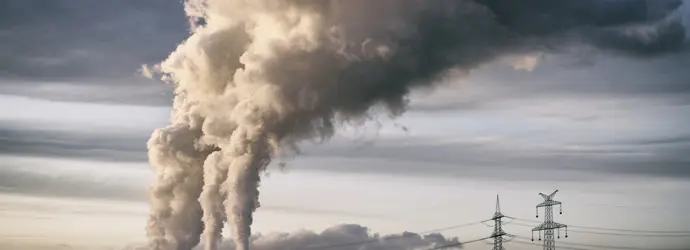
Whether it's your newborn baby’s signal of an upcoming nuclear nappy, or your lactose-intolerant partner’s fragile tummy after that fourth helping of cheese – we all know that all-too-familiar rotten egg smell of escaped wind. And if it smells, it might contain a greenhouse gas: methane! Now of course, your trapped wind won’t have a lasting impact on the planet, but greenhouse gases and the greenhouse effect might, so it’s important to know: what are greenhouse gases? And what is a greenhouse effect?
Here we’ll look at the key questions: what are greenhouse gases? What is and what does the greenhouse effect do? How can we reduce greenhouse gases and play our part in reducing the effects of global warming? We’ll also take a look at some ways both companies and individuals can reduce greenhouse gases, suggesting some methods you can implement right away!
What are greenhouse gases?
Let’s start with a simple definition of what a greenhouse gas is. The main gases are:
- Carbon dioxide
- Nitrous oxide
- Methane
- Water vapour
- Chlorofluorocarbons
What do greenhouse gases do?
Greenhouse gases warm the planet, trapping heat in the atmosphere. They allow sunlight to come into the atmosphere but also prevent the heat from leaving by reflecting it back to the ground – much like the process that takes place in a common garden greenhouse.1
Now we know what greenhouse gases are and what they do, let’s delve a little deeper into their climate impact.
A straightforward greenhouse effect definition
What is a greenhouse effect? Greenhouse gases explain how our Earth is heated, and it’s their presence in the atmosphere, warming the planet, that is commonly known as the “greenhouse effect”. To put it simply, we can think of the greenhouse effect in this straightforward way: it’s like our planet is being wrapped in the glass panels that make up a greenhouse, and they’re trapping in heat.
So how does the greenhouse effect heat the planet?
Solar radiation from the Sun that is not taken in by the atmosphere, such as being bounced back by clouds, makes its way to the Earth's surface – where we are! Now, most of this energy is absorbed by the Earth when it reaches its surface, with a small amount being reflected. In total, roughly 70% of the incoming radiation is absorbed by both the atmosphere and the Earth's surface, while approximately 30% is sent back into space as reflection, without contributing to the warming of the Earth’s surface.2
Here’s a science-y bit: the Earth emits energy at longer wavelengths compared to the Sun (this is because the Earth is just a little cooler than the Sun). Some of this extended radiation is captured by greenhouse gases, which subsequently release energy in various directions, including downward, effectively trapping warmth within the atmosphere.2
The greenhouse effect is actually a good thing when the gases stay at the right levels. If we didn’t have greenhouse gases, the Earth would be a very chilly -18°C, instead of the mild 14°C we experience.2
So, if it’s a good thing, what’s the problem? What does the greenhouse effect do that negatively impacts the planet? That needs more investigation. The big problem, and the one that most concerns scientists, is that many of the activities that we humans undertake in our day to day lives are artificially ramping up the natural greenhouse gas effect. Let’s look at the process in more detail.
What causes greenhouse gases to negatively impact our climate?
As humans, we have created a huge increase in the amount of greenhouse gases in the atmosphere over the past 100 years, and this is still increasing.3 This has led to more heat being trapped, that in turn causes our climate to change with more extreme changes in weather patterns.4
The cause of that increase? Human practices,3 such as:
- Burning fossil fuels for industry, heating, electricity and transport – a source of carbon dioxide.
- Deforestation – also a source of carbon dioxide.
- Agriculture with livestock breeding – a source of methane. (Don’t worry, your flatulence might destroy your loved ones’ nostrils, but it won’t change the world!)
What does the greenhouse effect do to the planet?
It’s time to consider the consequences of human activity on the greenhouse effect. The reality is that our way of life has led to the increased rate of greenhouse gas emissions into the atmosphere. In fact, greenhouse gases are at their highest levels for 2 million years. This has led to the temperature of the planet continually rising, with the average temperature of the planet 1.1°C higher than it was in the 19th century.5
But that doesn’t just equal warmer days and more sun – our planet is sensitive and many biological systems are affected by even slight increases in temperature. Over time, as the gases trap in more heat, this has led to climate changes that cause lasting damage to habitats, as well as extreme weather, draughts, storms and heavy rainfalls.5 The natural order of environmental processes has been significantly disturbed, leading to troubling knock-on effects for the health of humans and animals.
The rise in temperature is even higher at the poles, which has led to the rapid melting of glaciers and sea ice.6 This causes sea levels to rise, which increases coastal erosion.7 Oceans warm up, causing the sea level to rise and the loss of marine biodiversity.8
This might all seem very gloomy, and climate change is a serious issue. But the best thing we can do is educate ourselves – which you're doing right now! – and educate others on how to reduce our carbon footprints and make changes – no matter how big or small.
How can reduce greenhouse gases at the industrial scale?
Now that we understand the greenhouse effect’s meaning and its relation to climate change, we can start to look at ways to reduce emissions.
The ways in which greenhouse gases can be reduced on an industrial level are a bit different to how we can do our bit in our daily lives. So, first let’s look how businesses can reduce greenhouse gas emissions:
1. Energy efficiency improvements:
- Upgrade lighting systems to LED or energy-efficient bulbs.
- Implement energy-saving HVAC systems and optimize temperature settings.
- Conduct regular energy audits to identify areas for improvement.
2. Renewable energy adoption:
- Install solar panels or wind turbines on company premises.
- Purchase renewable energy from local providers or invest in off-site renewable energy projects.
3. Transportation and fleet management:
- Transition company vehicles to electric or hybrid models.
- Encourage virtual meetings to reduce employee travel.
- Optimise transportation routes and logistics for fuel efficiency.
4. Waste reduction and management:
- Implement a comprehensive recycling program for paper, plastics, and other materials.
- Minimise single-use plastics and promote reusable alternatives.
- Compost organic waste and promote waste reduction initiatives.
5. Circular economy practices:
- Implement circular economy principles, such as product recycling and remanufacturing.
- Design products with durability and recyclability in mind.
These are just some of the ways businesses and corporations can reduce greenhouse gas emissions. Due to the scale that some businesses operate at, implementing some of these ideas can have a real, tangible impact effect on reducing the greenhouse effect, meaning the environment can be in a better place in the future.
How can we reduce greenhouse gases at home?
We’ve taken a look at what causes greenhouse gases and what companies can do to reduce greenhouse gases. And while it is crucial for corporations to do their bit for the planet, there’s also a lot we can do at home, too! It’s important to remember that while the actions you take can feel minimal, when you add them all up, they can make a real difference.
But remember: try not to get burnt out or let yourself feel guilty for your carbon footprint – just do what you can and enjoy the feeling that comes with it! With that in mind, here’s how we can reduce greenhouse gases at home:
- Reduce plastic consumption. Plastics from finite materials creates greenhouse gases in its production. There are easy switches we can make that don’t involve reducing plastic in our lives, like using renewable plastics instead of single use plastics where possible.
- Choose products with recyclable packaging. Opting for packaging that can be recycled, and is made from renewable and recycled materials in the first place, is another way we can reduce the amount of fossil resources being used. Teaching your little ones how to recycle is a great way to get the whole house onboard! Read our guide on how to make this a fun game for your kids.
- Compost your waste. As well as recycling, why not consider composting some of those confetti-cannoned potato peels that somehow always end up everywhere!? It’s a great way to divert waste from landfill while providing essential nutrients to your garden at the same time.
- Use less energy and renewable energy supplies. Burning fossil fuels (such as gas, oil and coal) to create energy is one of the reasons greenhouse gas levels have risen so much in the atmosphere. But there are alternative sources of energy that don’t have such a negative impact, and these include renewable sources such as solar power, energy generated from wind turbines and biomass (organic materials like wood, crops and waste). You can find ways to reduce the use of energy and switch to energy suppliers using renewable sources, and look for products that are made with renewable energy.
- Use less electricity and water. By reducing your energy use, you produce fewer emissions. There are lots of simple steps you can take, like turning off lights when we’re not in the room.
- Make your home more energy efficient. If your finances allow, you can make investments that will help your home retain heat – like installing improved insulation, double-glazed windows and more efficient heating solutions like heat pumps. These changes will also save you money on your energy bills in the long-term.
- Take alternative transport options. Friends of the Earth lists transport as one of the UK's biggest problem areas for greenhouse gases (the other is heating), so this is an important area to focus our efforts on. Vehicles that use petrol or diesel create more greenhouse gas emissions than other modes of transport, such as bicycles – and our own two feet!
- Plant a tree. Deforestation plays a huge part in greenhouse gases, as trees help remove carbon dioxide from the air. Although it’s difficult to influence this on a large scale, we can make a positive change by increasing the number of trees in our local areas. You can do this literally, or donate to trusts that can plant trees on your behalf.
- Eat less meat. Meat production is a major driver of deforestation and creates high greenhouse gas emissions. By eating less meat, we can help curb the effect that this industry has on the environment. You could ease yourself in with a Meat Free Monday, and enjoy discovering new grains and vegetables.
Tip
Did you know Plenty Original kitchen roll sheets are now certified compostable?* Now life’s little messes can be turned into nutrient rich compost for your soil! But be sure to only use them on compostable messes!
How can we reduce greenhouse gases at Plenty?
At Plenty, we care about you and the planet. With a focus on creating caring and innovative products, Plenty kitchen roll is made from responsibly sourced fibres. With meaningful changes like this to our manufacturing, we are working to significantly reduce the impact our tissue products have on the environment, all while ensuring they give the very best performance.
We are constantly striving to reduce our environmental footprint. One of the ways we’re achieving this is through our CO2-reduced packaging**, which is recyclable and made with post-consumer recycled plastic.
At Plenty, we're taking steps to reduce the carbon footprint of our packaging** even further, while committing to a goal of 100% of our packaging being recyclable and the use of 85% renewable or recycled materials in our packaging by 2025.
With a better understanding of what causes greenhouse gases, as well as how we can reduce greenhouse gas emissions both at home and how companies can do so,
we can all do our bit to help reduce emissions, and play a role in protecting the planet for future generations.
Want to know more about Plenty’s compostable kitchen roll sheets? Check out the answers to your frequently asked questions.
*Plenty kitchen towels are certified as home and industrially compostable according to NF T 50-800 and EN14995.
**Carbon footprint reduction of the packaging due to use of recycled plastics vs. our previous packaging made with fossil-based plastics, based on Life Cycle Assessments conducted by Essity and verified by third party.
Sources:
1 National Grid, What are Greenhouse Gases?
2 World Meteorological Association, The Sun’s impact on the Earth
3 United States Environmental Protection Agency, Global Greenhouse Gas Emissions Data
4 Met Office, How is Climate Linked to Extreme Weather?
5 United Nations, Climate Action Fast Facts
6 MIT Climate Portal, Which parts of the planet are warming the fastest, and why?
7 The London School of Economics, How is climate change affecting coastal flooding in the UK?
8 United Nations, How is climate change impacting the world’s ocean?
Related articles
Clean and green! 10 tips for eco-friendly cleaning
From baking soda and lemon cleaning methods to a surprising kitchen cupboard treatment for mould, read our sustainable cleaning products ideas for your home!

7 steps to create a DIY cardboard castle at home
Learn how to make a cardboard castle to fit their favourite interests. Find step-by-step cardboard castle DIY instructions and theme ideas here.

Reducing waste at home: The easy way
Find out how to save energy at home and reduce food waste with our top tips. Read on for handy pointers for making your household more eco-friendly.

6 tips on how to save water at home
Learn how to save water at home. Find five easy ways to conserve water, so you can bring down your waste and make some clever savings in the process, here.

What does biodegradable mean and what is non-biodegradable?
Biodegradable and non-biodegradable? What do they mean?! Don’t fret, discover the definitions and biodegradable materials to become an eco-friendly pro!

How to lead a sustainable lifestyle in 5 key ways
Learn how to live more sustainably with our tips on diet, methods of transport, energy consumption and product choices. Find sustainable living examples here.



